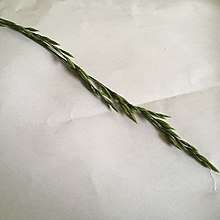Arrhenatherum
Arrhenatherum, commonly called oatgrass or button-grass, is a genus of Eurasian and North African plants in grass family.[4][5][6][7]
| Arrhenatherum | |
|---|---|
 | |
| tall oatgrass (Arrhenatherum elatius) | |
| Scientific classification | |
| Kingdom: | Plantae |
| Clade: | Tracheophytes |
| Clade: | Angiosperms |
| Clade: | Monocots |
| Clade: | Commelinids |
| Order: | Poales |
| Family: | Poaceae |
| Subfamily: | Pooideae |
| Supertribe: | Poodae |
| Tribe: | Poeae |
| Subtribe: | Aveninae |
| Genus: | Arrhenatherum P.Beauv. |
| Type species | |
| Arrhenatherum avenaceum | |
| Synonyms[3] | |
| |
Description
Wild forms can resemble wild oat (Avena) or fescue (Festuca). Oatgrasses are very common perennials with yellowish roots. The shining stems grow to a height of 1.5 meters, but die off in winter. The leaves are hairless with blunt ligules. The inflorescence is a panicle with two-flowered bisexual spikelets.[8]
- Arrhenatherum album - tall oatgrass - Mediterranean from Portugal to Cyprus
- Arrhenatherum calderae - Tenerife in Canary Islands
- Arrhenatherum elatius - false oatgrass, tall oatgrass, tall meadow oat - Eurasia + North Africa from Iceland to Canary Islands + Kazakhstan; naturalized in East Asia,[10] Australia,[11] New Zealand, the Americas[12][13]
- Arrhenatherum kotschyii - Turkey, Caucasus, Syria, Lebanon, Palestine, Jordan, Iraq, Iran, Afghanistan
- Arrhenatherum longifolium - France, Spain, Portugal, Morocco
- Arrhennatherum palaestinum - eastern Mediterranean from Greece to Iraq
- Arrhenatherum pallens - Portugal
- formerly included[3]
numerous species now considered better suited to other genera: Avenula Danthoniastrum Duthiea Helictochloa Helictotrichon Sphenopholis
gollark: It would be nice to *not* do that in some ways, but not doing that would be... hard.
gollark: So it would have to create an entirely new version of the page on every box toggling, and also map your click to the original position in the source.
gollark: Instead of an event log or something.
gollark: The problem is that this is mostly patterned off wiki engines. Unlike in newer not-particularly-revision-history-using systems, all history is kept in full form.
gollark: While that would be nice it's also completely incompatible with the data model, unless you manually go to the "edit" page, fill in a box, and save.
See also
References
- lectotype designated by L.K. Pfeiffer, Nom. 1: 274 (1872)
- Tropicos, Arrhenatherum P. Beauv.
- "World Checklist of Selected Plant Families: Royal Botanic Gardens, Kew".
- Watson L, Dallwitz MJ. (2008). "The Grass Genera of the World: Arrhenatherum". The Grass Genera of the World. Retrieved 2009-08-19.
- Palisot de Beauvois, Ambroise Marie François Joseph. 1812. Essai d'une Nouvelle Agrostographie 55-56 descriptions in Latin, commentary in French
- Palisot de Beauvois, Ambroise Marie François Joseph. 1812. Essai d'une Nouvelle Agrostographie plate XI (11), figure V (5) at lower left line drawings of Arrhenatherum avenaceum
- Altervista Flora Italiana genere Arrhenatherum
- Valdes, B. & H. Scholz. 2006. The Euro+Med treatment of Gramineae - a generic synopsis and some new names. Willdenowia 36(2): 657–669
- The Plant List search for Arrhenatherum
- Flora of China Vol. 22 Page 322 燕麦草属 yan mai cao shu Arrhenatherum P. Beauvois
- Atlas of Living Australia, Oatgrass, Arrhenatherum elatius (L.) P.Beauv. ex J.Presl & C.Presl
- Biota of North America Program 2013 county distribution map
- Rosengurtt, B., B. R. A. Maffei & P. I. Artucio. 1970. Gramíneas Uruguayas [i–vii], 1–489. Universidad de la República, Montevideo
This article is issued from Wikipedia. The text is licensed under Creative Commons - Attribution - Sharealike. Additional terms may apply for the media files.